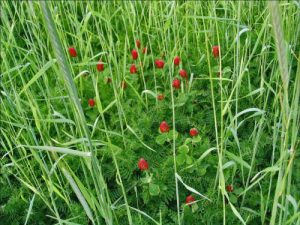World Soil Day (WSD) is held annually on December 5th to focus attention on the importance of healthy soil and advocating for the sustainable management of soil resources. An international day to celebrate soil was recommended by the International Union of Soil Sciences (IUSS) in 2002 and the UN General Assembly responded by designating the 5th of December 2014 as the first official World Soil Day.
What’s the problem?

Many people think of soil as an infinite resource to be used, but many factors can reduce the health of soils to where they are not usable for human needs. As an estimated 95% of our world’s foods are produced directly or indirectly on soil, this is extremely important for future generations. Soil pollution can alter soil biodiversity, reduce soil organic matter and reduce soil capacity to act as a filter. It can contaminate the water stored in the soil and groundwater. Soil pollutants can be heavy metals, persistent organic pollutants and emerging pollutants – like pharmaceutical and personal care products. Soil compaction can reduce several factors such as root penetration and water/gas exchange and can decrease crops yields by as much as 60%. Fertility mismanagement can contribute to nutrient loading and poor water quality. Soil is an excellent filtration system but excess nutrients from fertilizers can surpass the filtration capacity and cause nutrient loading in the water supply. Soil erosion can accelerate the removal of topsoil from the land surface through, wind, rain, or tillage. Traditional agricultural tillage practices can increase this rate.
So, how can you help?

Soil health is not one person’s problem but affects everyone and even you can do a small part to improve the soils around you. Educating friends, neighbors, and co-workers about soil health can be a big step to reduce the pressures on soil health. Litter prevention, proper disposal of paints, oils, and other chemicals, and reduced reliance of plastics are all topics that can help reduce soil pollution. Educate family and friends about sustainable food production.
At home: Try composting and recycling which can reduce the amount of waste that enters landfills. If you fertilizer your own lawn, do so wisely. Use the proper amounts required by the fertilizer, don’t apply when a flood advisory is in affect and keep your distance from waterways and storm drains. Turf and landscape plants can act as pollutant filters as well, but only when healthy.
On farms: Try using a cover crop with your normal crops or pastures. Cover crops, such as clovers, or ryegrass have been shown to reduce soil erosion, mitigate weed populations and add nutrients and organic matter back into the soil. Get a soil analysis every couple of years for proper fertilizer recommendations to prevent excess or poor nutrient levels. Rotate livestock between pastures to reduce soil compaction.

According to the Food and Agriculture Organization of the United Nations (FAO): 815 million people are food insecure and 2 billion people are nutritionally insecure, but we can mitigate this through soil. For more information on World Soil Day, go to the FAO’s site at: http://www.fao.org/world-soil-day/en/
 0
0
